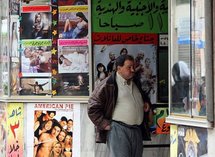Private sector urged to take leading role in Syrian film
Ahmad Khatib
DAMASCUS, Ahmad Khatib - Syria, whose award-winning television series have taken the Arab world by storm, wants the private sector to move in on films, an industry in which the state says it has done more than its share.
"The ball is in their court now," said Mohammed al-Ahmad, director general of the state-run National Film Organisation, stressing that the private sector has been offered a host of incentives.

A Syrian man buys a ticket to watch a movie at a cinema in Damascus.
"In my opinion, advancing cinema in Syria has become the responsibility of the private sector. It should play a key role because the state has done its utmost, and more than enough."
The NFO chief invited private sector producers "to adopt movie productions the same way they have done with television drama."
"Today the private sector produces 50 drama serials a year, compared to only two in the past when the general organisation of radio and television handled this," he said.
"We seek to establish a partnership with the private sector, but I think the private sector should work independently from the government. Let the private sector produce and let the government produce, and people will judge them."
Syria's television drama industry is booming, having won popularity across the Arab world. Meanwhile, fingers have been pointed at the government for the demise of Syrian cinema.
Since its creation in 1963, the NFO, a culture ministry-affiliated body which promotes local films and cine culture, has produced two feature-length films and several documentaries a year.
It "enjoys financial and administrative independence," according to its website, but the organisation's budget is limited.
The NFO is also responsible for the annual Damascus Film Festival and a "cinematic city," which provides a technical base to develop the industry in the Arab country.
"We receive funds from the state but we are required to raise our own funds for our projects," Ahmad said. "We are thinking of opening the door for the private sector to manage the city. We are still thinking about it."
According to Ahmad, producing a feature film in Syria costs between 400,000 and 600,000 dollars, while a documentary requires 20,000-30,000 dollars.
He insists the state has provided incentives, including tax and customs exemptions for five years to encourage private film-makers and cinema owners to buy equipment, import films and improve or build theatres.
Until 2001, only the NFO had the right to import and distribute films.
"All these facilities have responded to demands from the private sector, but unfortunately they did not move. Enough of blaming the state," said Ahmad.
"The state, which now runs seven cinema theatres, should not be responsible now for building more. In order to promote Syrian films, more cinemas need to be built."
Last year, a new private CinemaCity complex with two separate theatres, a rash of restaurants and a bookshop opened in the heart of Damascus.
The inauguration was the first time since 1985 that a new cinema has opened its doors in the Syrian capital, and brings to just 10 the number of theatres catering to a population of some four million people.
The total number of cinemas across Syria has slumped from 158 in 1964 to 36 today -- in a country of 22 million people.
Prominent Syrian director and producer Haitham Hakki agrees on the need for a partnership between the public and private sectors but called for more support for independent filmmakers and "less censorship."
"It's true that the private sector is required to work, but the state should support it and minimise censorship," he told AFP from Morocco.
Hakki said the NFO needed more state funding. "If the NFO receives 150 million (Syrian) pounds (3.2 million dollars), it can help the private sector produce five films a year," he said.
"Syria has great directors and it can make 20 movies every year. We have excelled in drama serials, and we can do the same in cinema."
Hakki was the screenwriter of Syrian director Hatem Ali's debut feature-length movie, "The Long Night," which has garnered critical acclaim and Arab awards.
The drama in which three aging political prisoners are suddenly told they are finally going home after two decades behind bars awaits official approval for screening in Syria.
All television programmes, plays and movies in Syria have to be approved by a state-controlled body before going on public release.
"There is a vicious campaign against Syria and it's important that we protect our society and country, and that's why we have to approve films in advance," said Ahmad.
"At the NFO, we seek to give the world a chance to know Syria, its culture and people. Our movies enjoy a margin of freedom, deal with thoughts and tackle issues."
--------------------------------------------------------------------------------